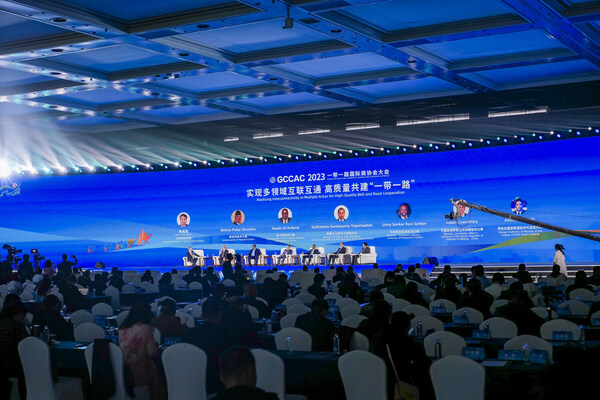The China proposed Belt and Road Initiative (BRI) has brought the vision of "heart connectivity" to reality, and it is a path to common development, multiple ambassadors and officials from BRI partner countries said on Wednesday during a roundtable held in Fuzhou, East China's Fujian Province.
"The BRI has brought changes in the mind of the world," said Bishnu Pukar Shrestha, Ambassador of Nepal to China, noting that the initiative focuses on connectivity, not only in transportation, but also in minds and hearts.
"This vision and concept have now become possible to access," Shrestha continued. Nepal has benefited a lot from the BRI, and there are different projects that have been completed in Nepal, including railways and roads, which have energized bilateral cooperation and allowed the country to continue to develop, he said.
Shrestha made the remarks during a roundtable on the Belt and Road Global Chambers of Commerce and Association Conference, which is the world's first international cooperation and exchange platform with chambers of commerce, industry associations and other social organizations as the main participants. The conference, which is held annually, aims to harness the resources of chambers of commerce as the BRI cooperation advances, and to explore new international cooperation opportunities.
"The BRI gives an opportunity to the world that is connected now, and the potential for the initiative is unlimited," Awale Ali Kullane, Somali Ambassador to China, said during the roundtable, noting that the COVID-19 pandemic has delayed the process, but it has also shown the importance of such a global initiative.
Kadirkamu Kandasamy Yoganaadan, chargé d'affaires of Sri Lanka's Embassy in China, enumerated a number of infrastructure construction projects under the BRI including ports, airports and expressways. Taking the Colombo Port project as an example, Yoganaadan said that it is being built with the modern sustainable design and smart city concept, providing investment opportunities in the IT industry, financial services and shipping logistics.
Ahmed Chouaib, chargé d'affaires of the Mission of the League of Arab States in Beijing, said that Arab countries participating in the BRI are demonstrating a high degree of engagement with China. This initiative represents the power of international cooperation, a power of interconnectivity that crosses national and ethnic boundaries.
Chouaib noted that strengthening people-to-people communication between China and Arab countries has also become an integral part of the BRI, and cultural, tourism and artistic cooperation have all emerged.
The BRI is a symbol of unity between China and Arab countries. As well as building roads and bridges, it can also create more interconnected, prosperous and harmonious cooperation, said Chouaib.
 Pages you might like
Pages you might like








 Latest information
Latest information
 Follow official account
Follow official account
 Online support
Online support
 鄂ICP备2022017323号
鄂ICP备2022017323号
 鄂公网安备 42018502006493
鄂公网安备 42018502006493
 Launch Exhibition
Launch Exhibition
 Release information
Release information




 Today's topic
Today's topic








